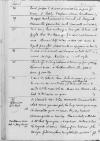Letter #5753
Alfonso de VALDÉS to Ioannes DANTISCUS[Toledo], [1528-12-14 or 1528-12-15]
English register:
Valdés couldn’t come to see Dantiscus because he had lots of business to attend to, and all the more since Dantiscus’ matters have not been dealt with yet. However, having learned from Dantiscus’ servant Guido that he planned to leave tomorrow, he asks to be informed so that he has time to say goodbye. He confirms the news of Lalemand’s dismissal and specifies that he was arrested. He suggests that Dantiscus celebrate this with an epigram.
Manuscript sources:
Auxiliary sources:
Prints:
| ||||||||||||||||
Text & apparatus & commentary Plain text Text & commentary Text & apparatus Excerpts concerning Dantiscus' travels
Salutem.
Multa me impediunt quominus ad te, uti statueram, venire possim, praesertim cum in tuo negotio nil boni actum esse sciam. Maximum mihi heri terrorem incussit tuus probably
Vale.
[1 ] cf. letter of Giudo Petri, cf.
